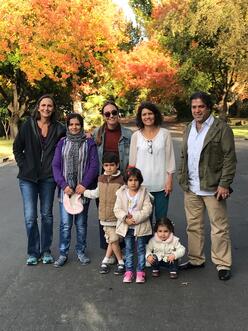
For many newly arriving refugee families in the Bay Area, the cost of living can be an enormous burden. But Farid and Lida Jebran say they have been fortunate to be resettled in the Bay Area, in no small part because of the support they received from their HOME team.
Close to midnight on July 20th, over six months ago, the Jebran family arrived in Oakland from their native Afghanistan. The family of five were taken to their new home in Antioch that had been lovingly furnished and outfitted by their new HOME team. HOME stands for Housing Outreach Mentorship and Education, and this team of IRC volunteers had been preparing for the Jebran family’s arrival for many months. The family sat down with a Dari interpreter to look back on the past six months of their journey in the U.S. and how they feel they came out on top.
The HOME program and its volunteers has allowed the Jebran family to more smoothly navigate their first six months in the U.S. After the intensive first 30 days with the IRC’s Reception and Placement program, the family was introduced to their mentor team, Rita, Audrey, Tracey, and Dianne, who have been visiting the family each weekend for the past six months. Farid and Lida, who knew virtually no English when they arrived, are now confidently conversing with their mentors. “They encourage me not to use a translator. I feel comfortable talking with them,” Lida said. Their mentors helped them enroll in an English as a Second Language (ESL) school down the road from their house. The ESL class provides childcare for their two children not yet in school and Lida attends three hours each day. “We are improving. The teachers tell me how much better my wife is getting at English, even her handwriting,” Farid said. Farid attended class for two months but stopped when he began employment with a medical transport company.
The family is lucky to have a good network of friends from Afghanistan living in the Bay Area as well. Farid said that his friends combined with the work of the volunteer mentors are helping them to adjust well. Farid explained how he will send pictures of his mail to his friends who will explain it in Dari, and then once he understands the mail’s purpose, he will pass it to his mentors to help him take action. The mentorship has turned into a friendship for which the Jebran family is very grateful. Both parents declared how much even their three children look forward to Saturdays with their mentors. From helping the family sort out issues with their landlord to celebrating birthdays together, Farid declared, “I feel welcome more than 100% and am happy to be in the U.S.” Lida emphasized that, “they listen to me anytime I ask for help and are very respectful.”
Lida’s life involves caring for her two young girls, aged 5 and 3, and her son who is in second grade now. She walks her son to school each day and attends the multi-national ESL class during the afternoons. She has made friends with the local Indian corner store owner who encourages her to practice English. Now that she’s earned her driver’s permit Lida is looking forward to learning how to drive.
After obtaining his driver’s license, Farid was able to gain employment as a driver. He emphasized that mobility was a key to gaining independence in the U.S. The Jebran family hope to join their friends in Concord once they save enough money to move to the area. A growing hub for Afghan families, every Sunday they gather together at a park in Concord where they picnic and play volleyball. Farid and Lida look forward to the day when they can live closer to the tightknit community.
Farid and Lida explained how much their mentors have helped them financially and emotionally. Ultimately, they hope to continue their connection with the mentors for years to come. Farid said, “They are very friendly, like a family member. We are going to continue this relationship. When I learn English, I will not let them go.”
For more information about the HOME program, contact Aria.Brock@rescue.org